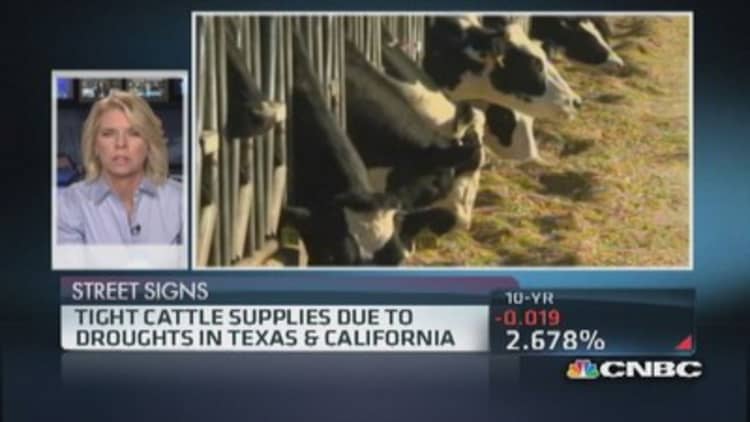There's little question that food prices are heading higher. According to the Bureau of Labor Statistics, food prices rose 0.4 percent in February, the most since September 2011. The higher costs cover the gamut of foods from meats and dairy products to fruits and vegetables.
It's a safe bet that consumers won't like feeling the economic pinch at the checkout stand. But does food inflation mean boon times for the stocks of food-producing companies like Archer Daniels Midland, and Hormel? How about retailers like McDonald's and Albertson's. Not likely say experts.
"Depending on where you are in the food chain, rising food commodity prices are not an indication of rising commodity revenues for companies," said Jack Plunkett, head of his own market research firm, Plunkett Research. "Inflation actually scares them."
He explained that unless a company dominates its food item, it has little if any power to control prices along the production line—prices that usually go up along with prices at the retail store.
Food companies know that consumers these days are highly sensitive to increased costs for what they eat and there's little benefit from price increases for anyone, Plunkett added.
"Before 2008 and the recession, people were a little less sensitive to higher food prices," he said. 'But now they are more wary of what it costs to buy food and companies have a difficult time passing on their rising costs and charge more because of that."

Industry changes driving investing
As for investors, dollars going into food companies are more a result of industry consolidation than a chance to chase inflation profits, said Paul Mariani, a director at investment banking firm Variant Capital Advisors. Indeed, the S&P food and beverage index is up 29 percent over the past year.
"The market is changing with companies buying other companies, especially the private-label firms that are popular with consumers," said Mariani. "That's what's driving investors more than inflation."
Recent deals like Mariani mentions include distribution company Sysco agreeing to merge with the privately owned US Foods for $8.2 billion including debt, while food packaging company WhiteWave Foods will acquire organic food giant Earthbound Farm for $600 million in cash.
Another reason food inflation limits any kind of revenue surplus are commodity contracts, said Bruce Taylor, CEO of fresh vegetable and fruit producer Taylor Farms.
'We're locked in with contracts to sell at a price for as long as three years so there's little advantage to us from inflation," said Taylor.
(Read more: Current commodity prices)
Average food prices for selected items, 1913 and 2013
| Item | January 1913 | January 2013 |
|---|---|---|
| Bread | $0.056 | $1.422 |
| Flour | $0.03 | $0.524 |
| Fresh milk, per gallon | $0.089/quart (or $0.356/gallon) | 3.526 per gallon |
| Cheese | $0.222 | $5.832 |
| Butter | $0.409 | $3.501 |
| Coffee | $0.299 | $5.902 |
| Potatoes | $0.016 | $0.627 |
| Rice | $0.086 | $0.715 |
| Sirloin Steak | $0.238 | $5.705 |
| Round steak | $0.205 | $5.074 |
| Chuck roast | $0.149 | $3.696 |
| Pork chops | $0.187 | $3.465 |
| Bacon | $0.254 | $4.407 |
| Ham | $0.251 | $2.693 |
| Eggs, per dozen | $0.373 | $1.933 |
| Sugar | $0.058 | $0.683 |
Source: Source: BLS Note: Price/lb unless otherwise noted. *Milk avg. prices were recorded per qt. in 1913 and per gal. in 2013. This is the avg price of butter in Jan. 2012. Data for Jan. 2013 were not available.
More inflation ahead
Causes for the recent surge in food price increases include ongoing droughts, unusually cold winter weather, rising exports and a virus outbreak in the hog population.
And prices will go higher. The Agriculture Department expects grocery store prices to increase as much as 3.5 percent in 2014, up from 0.9 percent in 2013.
(Read more: Farm bill: Bring on the hemp and sushi rice!)
"It's not to say there are some profits along the line, but food inflation is not a boon time," said researcher Plunkett.
—By CNBC's Mark Koba. Follow him on Twitter @MarkKobaCNBC.


